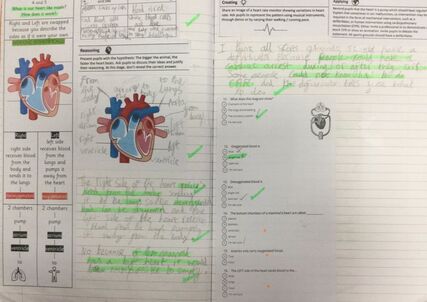SCIENCE
At Springfield Junior School, our science curriculum is an integral part of the CUSP curriculum. It follows the central CUSP principles of using high levels of vocabulary, explicit links to prior learning and a highly considered sequence of learning, in both knowledge and skills. It is rooted in exploration, enquiry and investigation, fostering a healthy curiosity of our universe and stimulating creative thought. Exploring everyday phenomena will provide children with the foundations for understanding the world around them and an appreciation for the awe and wonder that science holds. They will understand the fundamental importance of science: how science has changed our lives and our world, and how it is essential to the future of our planet.
Our Curriculum Intent
At Springfield Junior School, it is our intent that all children learn through practical first hand experiences and secondary sources, to develop their knowledge and understanding of the world in which they live. These experiences should enable children to observe, question, investigate, make sense of and communicate and evaluate their findings.
Implementation
We do this by:
- developing a questioning and reflective mind by providing a range of exciting and enjoyable activities
- developing a systematic and logical way of working
- applying their skills and knowledge to investigative work
- enabling children to come to a deepening understanding of scientific concepts
- working safely and carefully
Science is planned and assessed across the school with the children’s progression at the heart of what we teach. Progression and links between topics and year groups can be seen in the science content grid. Teachers use PLAN assessment resources produced by the ASE (Association of Science Education) to support them with planning and formative assessment. We also use TAPS (Teacher Assessment in Primary Science) resources, which provide support for selecting a skill to focus on within an enquiry.
Working scientifically
Although the ‘Working scientifically skills’ are described separately in our curriculum content, they are always taught through the different knowledge topics and concepts in each year group. Teachers use a range of enquiry types to do this - research using secondary sources, fair testing, observing over time, pattern seeking and identifying, classifying and grouping.
Promoting science talk and use of scientific vocabulary
At Springfield, we use a range of activities to help develop children’s thinking and oracy skills. These can be used for the retrieval practice of knowledge from a previous lesson, to introduce new learning or lead to further enquiries. Children are encouraged to use scientific vocabulary they have learnt when discussing their ideas with peers. Activities include: odd one out, true or false, meet the expert and what if?
I already know that… but I would like to find out about…
Children are always encouraged to ask and answer their own questions at Springfield. We think it is important that the children know they are scientists and leading their own learning. Before teachers plan new learning experiences, a classroom assessment is used to identify prior knowledge and possible misconceptions. Teachers use the Primary Science Teaching Trust resource ‘Explore, Extend, Engage’. This involves engaging practical activities with questions based on observing, describing, sorting, comparing and explaining observations.
Within Science sessions we aim to support pupils by:
*Promoting pupil voice
*Displaying learning, skills and vocabulary, in the classroom, on our 'Loops of Learning' wall
*Using an enquiry led approach; key questions and ancillary questions
*Providing a diverse and creative curriculum which addresses the needs of all
*Building aspiration through creating opportunities for children to have wider experiences; visits, trips and through making links to real life contexts
impact
The successful approach to the teaching of science at Springfield Junior School will result in a fun, engaging, high-quality science education that provides children with the foundations for understanding the world that they can take with them into their future lives.
Children at Springfield Junior School will:
- demonstrate a love of science work and an interest in further study and work in this field
- retain knowledge that is pertinent to science with a real life context
- be able to question ideas and reflect on knowledge
- be able to articulate their understanding of scientific concepts and be able to reason scientifically using rich language linked to science
- apply mathematical skills through their work, organising, recording and interpreting results
- work collaboratively and practically to investigate and experiment
- achieve age related expectations in science at the end of their cohort year

